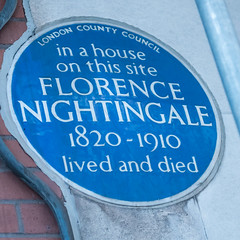

Dame Florence Nightingale OM DStJ RRC
(1820-1910)
woman, nurse, writer, statistician, DStJ - Dame of The Most Venerable Order of the Hospital of Saint John of Jerusalem, Royal Red Cross recipient, and Order of Merit recipient (from 1907)
Died aged 90
Wikidata Wikipedia Find A GraveFlorence Nightingale OM RRC DStJ (/ˈnaɪtɪŋɡeɪl/; 12 May 1820 – 13 August 1910) was an English social reformer, statistician and the founder of modern nursing. Nightingale came to prominence while serving as a manager and trainer of nurses during the Crimean War, in which she organised care for wounded soldiers at Constantinople. She significantly reduced death rates by improving hygiene and living standards. Nightingale gave nursing a favourable reputation and became an icon of Victorian culture, especially in the persona of "The Lady with the Lamp" making rounds of wounded soldiers at night. Recent commentators have asserted that Nightingale's Crimean War achievements were exaggerated by the media at the time, but critics agree on the importance of her later work in professionalising nursing roles for women. In 1860, she laid the foundation of professional nursing with the establishment of her nursing school at St Thomas' Hospital in London. It was the first secular nursing school in the world and is now part of King's College London. In recognition of her pioneering work in nursing, the Nightingale Pledge taken by new nurses, and the Florence Nightingale Medal, the highest international distinction a nurse can achieve, were named in her honour, and the annual International Nurses Day is celebrated on her birthday. Her social reforms included improving healthcare for all sections of British society, advocating better hunger relief in India, helping to abolish prostitution laws that were harsh for women, and expanding the acceptable forms of female participation in the workforce. Nightingale was a pioneer in statistics; she represented her analysis in graphical forms to ease drawing conclusions and actionables from data. She is famous for usage of the polar area diagram, also called the Nightingale rose diagram, equivalent to a modern circular histogram. This diagram is still regularly used in data visualisation. Nightingale was a prodigious and versatile writer. In her lifetime, much of her published work was concerned with spreading medical knowledge. Some of her tracts were written in simple English so that they could easily be understood by those with poor literary skills. She was also a pioneer in data visualization with the use of infographics, using graphical presentations of statistical data in an effective way. Much of her writing, including her extensive work on religion and mysticism, has only been published posthumously.
DbPedia
Family tree
Commemorated on 9 plaques
In a house on this site Florence Nightingale 1820-1910 lived and died
10 South Street, London, United Kingdom where they died (1910) and lived -1910)
Florence Nightingale left her hospital on this site for the Crimea October 21st 1854
90 Harley Street, London, United Kingdom where they worked
Ricordiamo il grande cuore di Florence Nightingale la "signora dalla lampada" qui nata il 12 maggio 1820 che dagli strazi della guerra e dall'eroica dedizione d'enfermiera trasse determinazione a creare il servizio di assistenza sanitaria degno di un mondo civile
Villa Colombaia, Via Imprunetana per Tavarnuzze, Bagnolo, Florence, Italy where they was born (1820)
Florence Nightingale [full inscription unknown]
The Nightingale Lodge, 1 Princes Road, Liverpool, United Kingdom where they worked
Florence Nightingale [full inscription unknown]
Abbey Road, Malvern, United Kingdom where they visited
Florence Nightingale. Florence Nightingale visited Harrogate in 1852, in company with her aunt, staying in this York Place house then occupied by Mrs Wright's lodgings. She went on to improve the wretched hospital conditions of British soldiers in the Crimea, reform medical and sanitary standards and raise the quality and status of nursing.
York Place, Harrogate, United Kingdom where they was (1852)
Florence Nightingale 1820-1910, Lived at nearby Lea Hurst. Heroine of the Crimean War, reformer of army medical services, pioneer of public healthcare and founder of the nursing profession.
Florence Nightingale Memorial Village Hall, Mill Lane, Holloway, United Kingdom where they lived near
Florence Nightingale 1820-1910 Pioneering social reformer, author, administrator, statistician and champion of nursing. The Nightingales lived here at Embley Park, 1825-1874
Embly Park, Woodington, United Kingdom where they lived (1825-1874)
Pink Plaque Project #D
Florence Nightingale (1820-1910) [full inscription unknown]
37 Highgate West Hill, London, United Kingdom where they was




